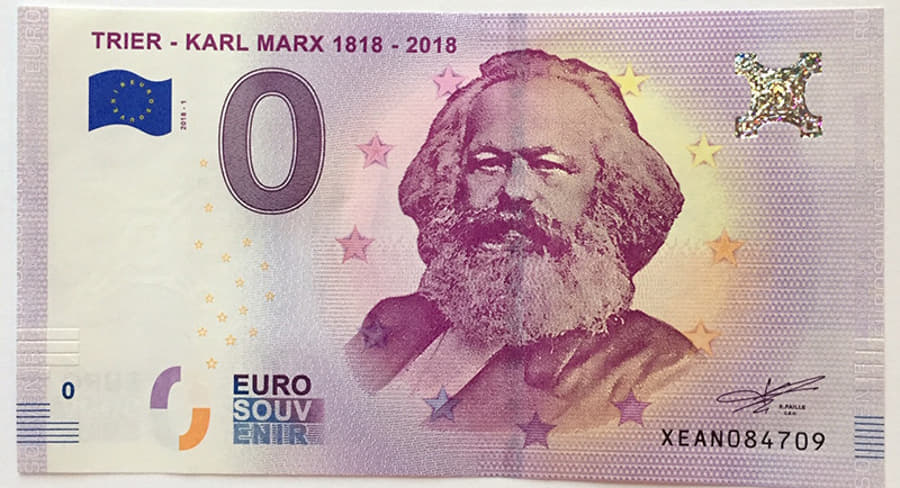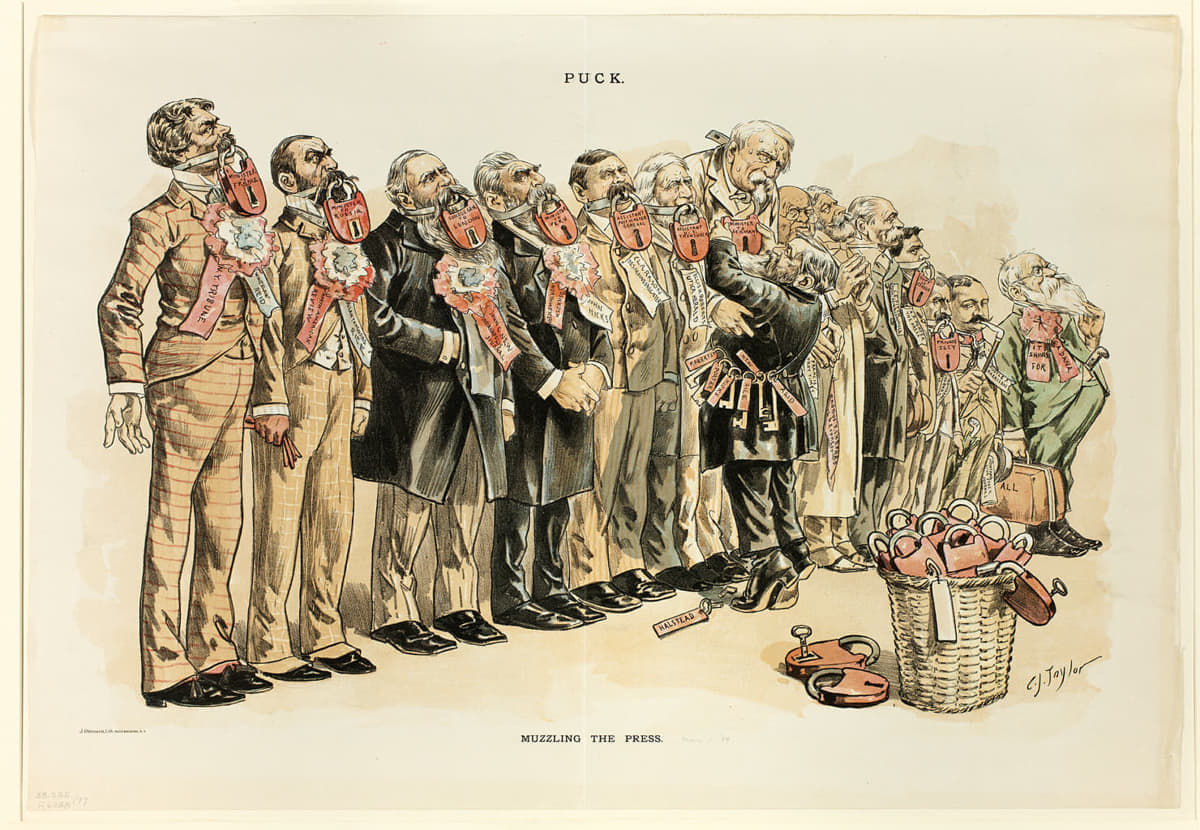Whether arms deliveries, “human trafficking” for the labor market, or authoritarian paternalism, government and media like to market this as “left-wing reason.” Der Spiegel even uses Karl Marx to propagate “green capitalism.” In truth, the rulers are deliberately deceiving us.
They once fought against domination and exploitation, for workers’ and women’s rights. Many felt their chains and joined them. The left was once the thorn in the side of the owners of capital and their ruling lobbyists. The history of industrial capitalism is paved with strikes and revolts that were bloodily put down. The enemy was visible.
Today, in the age of digitized monopoly capitalism, it is different. With psychologically ever more sophisticated propaganda, the rulers have successfully ensnared, manipulated and appropriated their adversaries. Even more—they disguise themselves as their former opponents. They boast of leftist ideas, such as anti-racism, cosmopolitanism, health and environmental protection, while their actions to the contrary reveal their hidden hypocrisy, time and again.
Der Spiegel, the obvious flagship for the dissemination of the fairytale of a supposedly “left-wing mainstream,” now even uses Karl Marx and his Das Kapital to propagate the vision of “green capitalism,” presumably conceived in some thinktank of the super-rich. The headline is emblazoned above the paywall as a lure for left-liberals “by instinct” and an indignation-trigger for right-libertarians: “Greener and fairer—Was Marx right after all?” Sounds as if the author of Das Kapital had once thought about reforms for capitalism. That’s sheer nonsense, of course.
Abuse of Leftist Masterminds for the Purposes of Domination
First, Marx’s Das Kapital is an early scholarly work on the workings of capitalism. The author analyzed the system with an eye to conditions in the 19th century. His findings certainly shed light on understanding its visible development to today. For example, Marx described the systemic concentration of capital, i.e., accumulation, and explained why this inevitably leads to the formation of monopolies. Such do visibly dominate the world economy and politics today.
In many other philosophical works—in contrast to Das Kapital—Marx sharply criticized capitalism. He opposed the exploitation of wage-earners by the owners of large means of production. Of course, Marx did not want to reform capitalism, as Der Spiegel would like us to believe. He certainly did not call for giving capitalist governments and states more power. His view of things was different: the state in a class society is the instrument of power of the rulers.
In truth, Der Spiegel propagates exactly what Marx, and later Lenin, had warned against: the total fusion of monopoly capital and politics as a consequence of accumulation—colored “green,” enforced in an authoritarian manner. For some, the vision of “less profit” certainly sounds tempting.
But taken to its logical conclusion, “less profit” by no means entails a renunciation of the rule of the few over the many. For most of the history of class societies, power has not depended on profits at all. The basis for rule has always been, at least as Karl Marx saw it, private ownership of the means of production. And of course, neither the government nor Der Spiegel want to shake that.
Fairytale Lesson about Capitalism
Der Spiegel also suggests that super-rich technocrats from Silicon Valley have stolen their ideas of regulating “nanny-states,” supposedly in favor of the environment, from left-wing masterminds. Put simply, that these are somehow leftist ideas. This is, of course, a misdirection.
But such a lie, put into the world in a roundabout way, brings a decisive advantage to the rulers: the people stop thinking about their fundamental situation in capitalism when they assume that “the leftists” are behind the agenda, which only promises more servitude than already exists. There is even a fairytale circulating—even in some academic minds—that the technocrats’ idea of “green capitalism” is socialist in nature.
Those who believe this tend to cry foul to one part of the oppressors, while giving the green light to the other part of them, and while even considering themselves critical of domination. Behind this is the fairytale of evil capitalists (technocrats) and good capitalists (everyone else). One could call it a clever ideological strategy of the rulers to steer protests into the void from the outset.
Demagogy for Critics of the System and “Leftists by Instinct”
The beliefs propagated directly and indirectly by Der Spiegel, in fact, serve all around the interests of the ruling front of monopoly capital and its politics. As a wolf in sheep’s clothing, this front lures the “leftists by instinct” as comrades-in-arms and steers the remaining resistance into politically confused nirvana. The demagogy behind this can be summarized in a few points.
First, the idea of “green capitalism” has as little to do with socialism as it does with Karl Marx or even any leftist idea. It is merely the fantasy of a continuation of capitalist rule on a state-monopolistic level, adapted to technologically developed productive forces.
Second, it suggests that classical industrial capitalism was at some point of great benefit to the wage-earning masses. This may have been true for the bulk of German workers for a few decades after World War II. But the price paid by billions of wage earners in the periphery was consistently high. The good capitalism in the idea of an idyllic vegetable market never existed.
Third, the lie of the alleged “left mainstream” drives many critics of the system into the hands of those who do not stand for an end to their oppression, but preach a return to classical industrial capitalism. This is already no longer possible because of the developed technology. Above all, however, such fantasies prevent thinking about an actual end to the exploitation of people and nature.
Fourthly, such demagogy catches on with many “leftists by instinct” who either have not read Marx or have not understood him. Presumably, some are flattered by the idea that leftist ideas have conquered (capitalist) politics and that they themselves can finally get involved. Ultimately, those who are seduced make themselves recipients of orders from the powerful.
Monopoly Capitalism with Nanny State
But let’s conclude with some outpourings in Der Spiegel article. Right under the headline it states:
“Classic capitalism no longer works. But driven by ever new world crises and a looming climate collapse, concrete reform ideas are emerging: less growth, more government targets.”
That “classical capitalism” as a competitive and pecking order produces economic crises, wars and environmental catastrophes without end is of course recognizable. Moreover, the “no more” is superfluous, because poverty, hunger and social misery have always been present, even tending to increase. But the supposedly “left-liberal” magazine then takes a remarkable turn:
Instead of reflecting on economic property relations as the fundamental cause of the problems, it preaches reformism under a strong state. The latter, of course, is supposed to remain the instrument of power of the ruling class to manage the wage slavery of the many under the premise of “less growth.”
But to be serious about Marx: Growth is based on the market competition of individual capitalists. If monopolies have been formed by this very competition, according to which the strongest wins, competition disappears, of course. The rule without competition does not need any more growth to stay in power. Authoritarian surveillance policy is sufficient for that.
Throughout the article, Der Spiegel skillfully pairs a charming critique of capitalism (which certainly contains many truths) with the fantasies of the super-rich world leaders. It sounds something like this:
“But now he [Ray Dalio, hedge fund founder) says phrases like this about capitalism: ‘If good things are overdone, they threaten to destroy themselves. They must evolve or die.’ Wealth and prosperity are now only distributed one-sidedly, he says, and those who are poor remain poor, with hardly a trace of equality of opportunity. Dalio demands an end to this. Capitalism urgently and fundamentally needs to be reformed. Otherwise, it will perish, and deservedly so.”
Instead of blaming the rulers themselves, the authors put the blame for the serious distortions on a “capitalism” that has somehow gotten out of hand, i.e., on something unassailable. Of course, they do not question the rule itself: A little reform is needed to mitigate the worst effects. And so it goes on:
“Criticism of capitalism is first of all nothing new. But in the dawning year four of the pandemic and year two of the Ukraine war, it is gaining noticeably in force. Too many things no longer work: globalization is crumbling and with it the German model of prosperity. The world is entrenching itself in hostile blocs. Inflation is causing rich and poor to drift further apart. Almost all climate targets have been missed. And politicians can no longer keep up with patching up all the ever-new cracks in the system.”
Apart from the fact that Lenin already knew that in monopoly capitalism, which has matured into imperialism, alliances of states naturally “entrench themselves behind hostile blocs” and wage wars for market domination: What do the authors want to imply by stating that politics is no longer able to “patch up all the ever-new cracks in the system?” This sounds like a call for all-round surveillance of citizens by the state.
That authoritarian forms of government and capitalism—in whatever form—are not contradictory is impressively demonstrated by recent history. The authors, of course, do not use the word “authoritarian.” Instead, they talk about a “new economic order,” even though, according to them, capitalism should remain:
“Calls for a new economic order are now growing louder from all corners, strikingly often from unsuspected ones. The Financial Times, international mouthpiece of the financial markets, proclaimed that it was time for neoliberalism to step down from the world stage.”
So now only neoliberalism is to step down, i.e., merely the market-radical superstructure for a “lean state,” which above all ensures free rein for large corporations. But to call this a “new economic order” is nonsense. To substantiate this with two extreme examples: Capitalism, after all, also worked in Chile under Pinochet and in Germany under Hitler—without any neoliberalism at all, but with cruel oppression of the people.
But the authors get carried away with fine words. A gentler, sustainable capitalism is needed. But who is to develop it? The billionaires in Silicon Valley? And what does this “gentler and more sustainable” mean for the people? Are they to become the disposal mass of tech-corporate-governed governments in the future, sweet-soundingly referred to as the “controlling state?” Obviously:
“Ideas for a fairer, greener—yet still free-market—order now abound. Proposals for such a gentler capitalism come from a wide variety of ideological camps, but common lines can be discerned: less market, more controlling state, and less growth by hook or by crook.”
Propaganda with Both Sides Taken for a Ride
Now, a “softer capitalism” is neither a leftist idea, nor would it end the exploitation of the majority by the few. Especially since it is not at all clear for whom the fantasy world of the powerful is supposed to be “gentler”—presumably mainly for the monopoly lords and their well-paid managers.
To dust off Marx and his Das Kapital for this venture is rather mendacious. But probably some left-feeling (and right-acting) bureaucrat functionaries cheered the agitators (or propagandists). And probably quite a few railed against the alleged “left mainstream” that never existed. Both fell for the targeted, ideological propaganda of the really powerful and their supporters.
Susan Bonath writes from Germany, where she studies painting and ceramics. This article appears courtesy of RT Germany.

